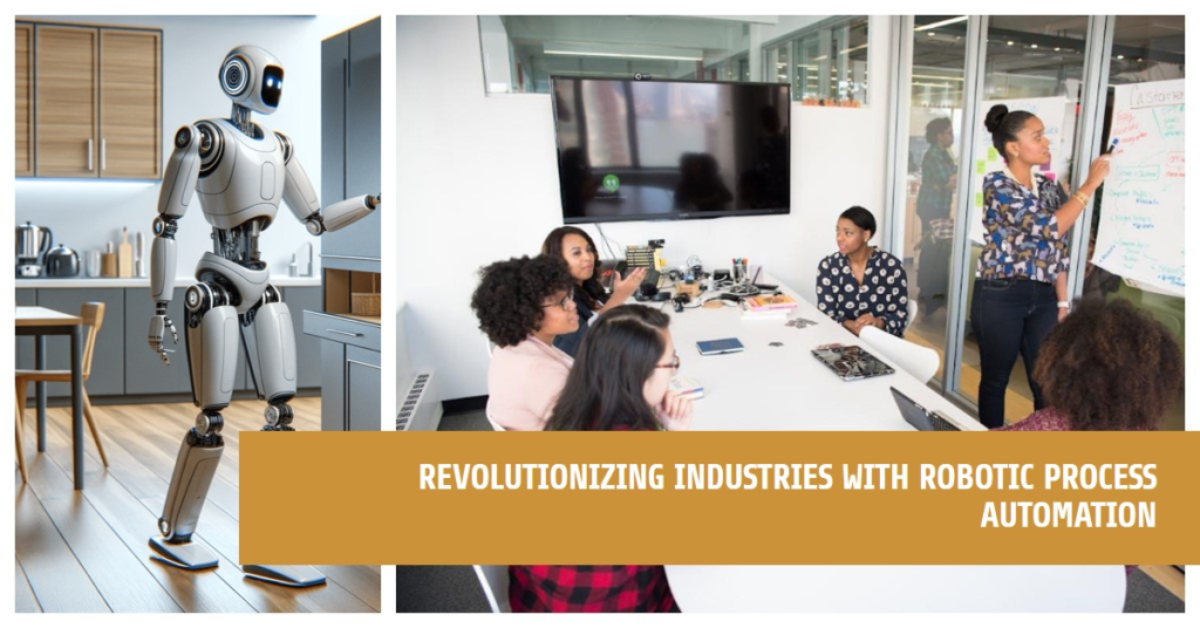Robotic Process Automation – Benefits and Applications Across Industries
Robotic Process Automation (RPA) enables businesses to automate repetitive tasks through software robots. These activities often include data entry, invoice processing, or updating records. RPA handles the mundane work. Now, employees can tackle complex, creative tasks that require problem solving.
Industries like finance, healthcare, retail, and manufacturing are using RPA more. They want to improve their operations. About 80% of finance leaders have either adopted or plan to adopt RPA.
This article shows the benefits and uses of RPA. It shows how this tech can add value in many sectors.
Cost savings and increased efficiency
RPA offers significant cost savings by reducing reliance on manual work. RPA bots can complete tasks that require much human effort in a fraction of the time. This cuts operational costs by a large amount. This is useful in data-heavy industries like healthcare and banking. Automating their processes saves time and money.
In addition to cost savings, RPA helps increase overall efficiency. Employees can focus on strategic tasks that add value to the business. They can shift away from tedious work. It boosts job satisfaction, too. Managers free workers from dull tasks.
Enhanced accuracy and reduced human error
Robotic process automation has a major advantage: accuracy. It almost eliminates errors in repetitive tasks. Human workers make mistakes in tasks like data entry due to fatigue and oversight. RPA bots, however, execute these tasks with high precision. They provide reliable results. In finance and logistics, this is crucial. Small mistakes can have big, negative impacts.
Also, RPA can run 24/7 without breaks or downtime. It will always perform at a consistent level. This operation helps businesses finish tasks on time and keep a smooth workflow. RPA has fewer errors and no downtime. So, it helps businesses improve their daily work.
Scalability and flexibility in operations
RPA provides scalability and flexibility that traditional methods struggle to achieve. It allows businesses to adapt quickly to increased workloads. They can deploy more bots as needed, without the long process of hiring or training new employees. This scalability is vital for e-commerce. Demand can spike during peak seasons or sales. Bots can handle these changes in workload without compromising on speed or accuracy.
RPA can integrate seamlessly with existing systems. It can adapt to changing business needs. Unlike human workers, organizations can reconfigure RPA bots to meet new demands. New tools or processes do not require training for them when introduced. This flexibility makes RPA a powerful tool. It helps companies streamline operations and stay agile in a competitive market.
Improved customer experience
RPA enhances the customer experience by speeding up processes and delivering quick responses. Automating routine tasks, like order processing and customer inquiries, speeds up service delivery. In telecom and insurance, companies can address requests in real time, without delays. This immediate response improves customer satisfaction and builds trust with the brand.
Alongside speed, RPA also helps maintain consistency in customer interactions. Customers expect the same service every time they contact a business. It should not vary due to human factors like mood or fatigue. This consistency is crucial. It builds a good reputation. It ensures customers feel valued at every interaction.
Reduced workload for IT teams
RPA greatly reduces the IT department’s workload. It handles many resource-heavy backend processes. RPA can handle system maintenance tasks, like software updates and data migration. This lets IT professionals focus on strategic initiatives instead of routine work. This helps streamlining operations and improve the IT team’s effectiveness.
Also, RPA usually integrates easily with existing systems. It doesn’t need major changes to the IT infrastructure. This means the deployment process doesn’t place a heavy burden on IT staff. With bots handling repetitive IT tasks, teams can innovate. They can focus on complex tech challenges that add business value.
Employee empowerment and satisfaction
RPA empowers employees by automating the tedious parts of their jobs. This frees workers from hours of data entry. It lets them focus on more interesting tasks that utilize their unique skills.
The introduction of RPA can foster an environment of creativity and innovation. Employees have time and space to explore new ideas. They can take on initiatives that help them grow and benefit the company. RPA improves employees’ work experience. It lets them focus on engaging, rewarding tasks.
Data analytics and insights
RPA improves data management. It helps businesses gain insights from their data. It can automate data collection, processing, and analysis. This helps generate timely, accurate reports. This capability is crucial for sectors such as retail and manufacturing, where understanding trends and patterns in data can lead to better decision-making. For instance, RPA can quickly compile sales data. It helps companies find top-selling products and areas for improvement.
Also, RPA provides accurate, complete records. This helps businesses meet compliance requirements. It creates audit trails and documentation that are vital for regulatory reporting. With better data access, organizations can improve operations, forecast better, and stay compliant with industry standards.
Applications across various industries
RPA has diverse applications across multiple industries, showcasing its versatility. In finance and banking, RPA automates back-office tasks, like account reconciliation. It cuts manual work and boosts accuracy. It streamlines tasks in healthcare, like managing patient data and scheduling. This frees medical professionals to focus more on patient care.
Manufacturers use RPA to manage inventory and supply chains. Retailers use it for order fulfillment, returns, and customer support. RPA’s adaptability across industries shows its great value. It improves efficiency, accuracy, and productivity in various operations.
Robotic process automation is changing how businesses work. It automates repetitive tasks and frees humans for more meaningful work. RPA has benefits. It saves costs, boosts efficiency, and improves accuracy. It’s scalable and enhances the customer experience. Thus, it is a valuable tool for companies in various sectors.


